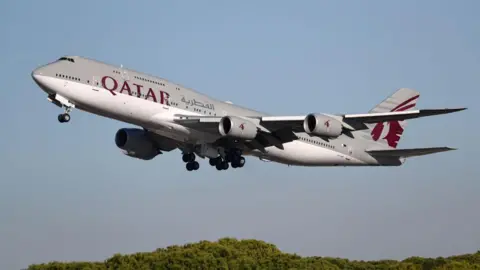In a recent development, discussions between the White House and the royal family of Qatar have centered on the possible transfer of a luxurious jumbo jet, intended for use as the presidential plane, known informally as Air Force One. This negotiation highlights ongoing diplomatic relations between the United States and Qatar, particularly as it relates to air travel for the president.
Notably, Qatar has formally denied that this aircraft would be gifted to the U.S. government. Instead, officials stated that discussions revolve around a “temporary use” arrangement for the plane. This indicates a nuanced understanding of diplomatic exchanges where even aircraft can be a point of contention and discussion among allies. According to reports from CBS News, which partners with BBC for coverage in America, the ultimate intention is for the plane to be donated to former President Donald Trump’s presidential library following the completion of his term in office.
This news coincides with Trump’s planned visit to Qatar, marking one of the first significant international trips of his second presidential term. The timing is crucial as it underscores the importance of maintaining and enhancing bilateral relations through direct engagement and discussions about shared resources. In the context of recent diplomatic efforts, such a visit demonstrates Trump’s commitment to strengthening U.S.-Qatar relations, which have been prominent in international politics.
Ali Al-Ansari, who serves as Qatar’s Media Attaché to the United States, clarified that negotiations are ongoing between the Qatari Ministry of Defense and the U.S. Department of Defense. He mentioned that the relevant legal departments in both countries are reviewing the circumstances surrounding this potential transfer, indicating that no final decisions have been made as of now. Additionally, sources informed CBS News that any aircraft provided may not be immediately operational due to the need for retrofitting and security clearance.
The potential value and implications surrounding the aircraft transfer could lead to significant legal and ethical discussions. Critics have already raised concerns about the appropriateness of such a transaction, especially when it involves the transfer of a luxury jet between foreign states. The White House press secretary, Karoline Leavitt, emphasized that any gifts from foreign governments would be handled in strict compliance with applicable laws, reinforcing the administration’s commitment to transparency.
In defense of the arrangement, Trump himself referred to the plane as a gift via a post on his Truth Social platform, asserting that it was offered for his use at no cost. He framed the acquisition as a temporary solution to replace the aging Air Force One aircraft, which has been in service for over three decades. Trump’s comments illustrate his ongoing efforts to frame the interaction positively, potentially appealing to both supporters and critics in the public sphere.
Current Air Force One capabilities include two Boeing 747-200B aircraft, which have been customized for presidential use and equipped with advanced communication technology, including a stateroom and office facilities. These planes have served since the early 1990s, yet discussions about updates or replacements have increasingly become necessary as they age.
The aircraft under discussion is reported to be a Boeing 747-8, which exhibits upgraded capabilities and sophistication compared to the current Air Force One models. Boeing was contracted to provide these modern planes but has faced criticism for delays in production timelines, announcing that newer aircraft would not be available until 2027 or 2028. Encountering dissatisfaction with Boeing’s performance, Trump expressed interest in alternative arrangements, highlighting the complexities and challenges inherent in governmental acquisitions.
Trump’s history of engaging positively with Qatar is noteworthy, including substantial defense contracts and aircraft purchases made by Qatar from the United States during his first term. Previous instances of luxury aircraft being gifted from Qatar to other nations, like the plane presented to Turkey in 2018, add context to the dynamics at play in this negotiation.
Overall, the potential acquisition of the Airbus from Qatar signifies more than just a transaction; it encapsulates broader themes of international relations, diplomacy, and the intricacies involved in providing necessary assets for presidential travel. The coming weeks will clarify whether this arrangement solidifies into an agreement or if it remains a topic for future discourse between these two nations.



